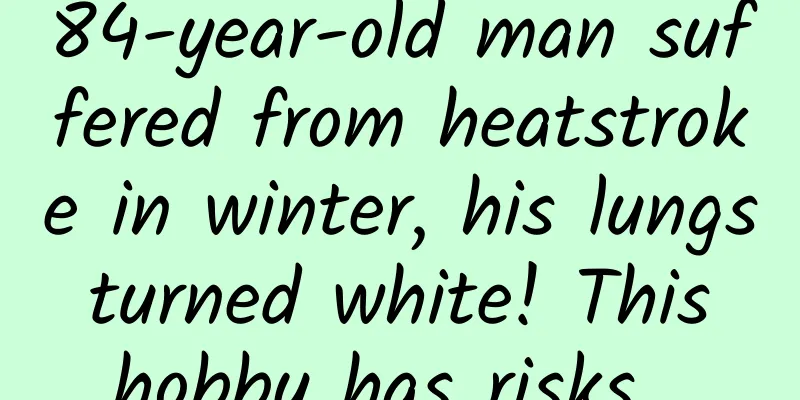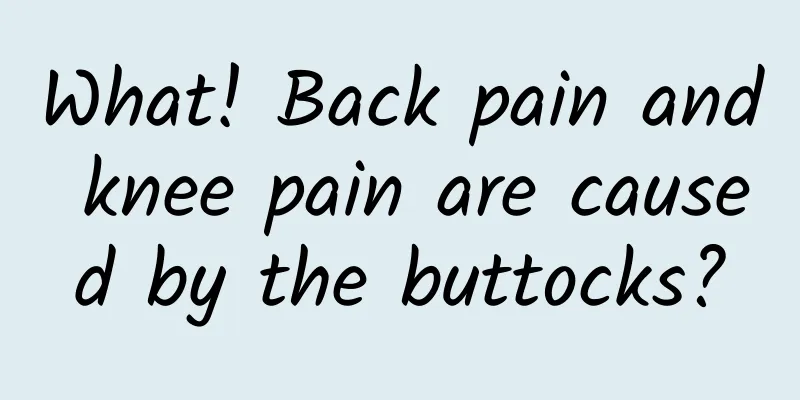84-year-old man suffered from heatstroke in winter, his lungs turned white! This hobby has risks...

|
Heat stroke, the most serious type of heat stroke, is a common health hazard in summer. But heat stroke can also occur in the cold winter! Mr. Han (pseudonym), who lives in Hangzhou and is 84 years old this year, likes to go to the bathing center to take a sauna bath and stay there for the whole day when winter comes. His family had tried to dissuade him, after all, the old man was over 80 years old and had high blood pressure , but Uncle Han refused to give up this hobby no matter how much they persuaded him. At the end of December last year, Mr. Han went to the bath center just after lunch as usual. Not long after he entered, he fainted and foamed at the mouth , vomiting all the food he had eaten at noon. Someone quickly called 120 and sent him to the nearest hospital. An 80-year-old man steamed his lungs in a sauna and made them whiter After receiving the patient, the doctors suspected that Mr. Han had pulmonary embolism or cerebral infarction . Mr. Han was unconscious, his blood pressure dropped, his heart rate dropped to 30 beats/minute , his oxygen saturation was only between 80% and 90%, and an emergency blood gas test showed that the pH was only 7.094, and the carbon dioxide partial pressure was as high as 77.4 mmHg. He had obvious type II respiratory failure and respiratory acidosis , so the rescue procedure was immediately initiated. Image provided by the hospital I got heat stroke in the winter Induced pulmonary edema The local hospital immediately contacted Shen Ling, chief physician of the Department of Respiratory Medicine at Hangzhou First People's Hospital, for consultation, and Mr. Han was eventually diagnosed with pulmonary edema induced by heat stroke . It's winter now, how can I get heat stroke? Shen Ling analyzed that when Mr. Han was admitted to the hospital, his procalcitonin level was significantly elevated. There are more than a dozen non-infectious diseases that can cause elevated procalcitonin, but none of them matched the patient's condition. Instead, it matched the symptoms of heat stroke. It turns out that heat stroke can cause elevated procalcitonin (PCT) , which is mainly related to the body's stress response, inflammatory response, and organ function damage in the heat stroke state. In a sauna room, a special environment with high temperature and high humidity , it becomes extremely difficult for the human skin to dissipate heat, and sweat cannot be discharged normally, as if it is "locked" in the body. This situation will also cause a large amount of heat to accumulate in the body . Even in winter, it is entirely possible to experience symptoms similar to heat stroke in summer, especially for the elderly with underlying diseases. After heat stroke occurs, dehydration will occur, which will cause the patient's blood pressure to drop. In severe cases, it will cause damage to the myocardium and greatly affect heart function. It is easy to develop acute heart failure with short-term heart function. Once the heart's pumping function has problems, a large amount of blood will accumulate in the lungs, causing pulmonary edema. Heat stroke is not a "disease exclusive to summer" Taking a bath in winter to prevent heat shock In the cold winter, many people choose to take a hot bath in a warm bathtub to relax their body and mind and dispel the cold. However, they do not know that the alternation of cold and heat can easily lead to "heat shock". Shen Ling said that drastic temperature changes will increase the burden on the circulatory system , which will not only induce cerebral stroke or cardiovascular disease, but also cause sudden shock in severe cases. This is especially true for people with arteriosclerosis, diabetes, hypertension, obesity, hyperlipidemia, hyperuricemia, and the elderly. Shen Ling reminded us to keep three things in mind when bathing in winter to prevent heat shock: Eliminate temperature differences between environments Install space heaters in places that feel cold, such as locker rooms (where you take off your clothes), hallways, and toilets, to warm up your body before entering the bathroom. Do not take a shower immediately after eating or drinking After a meal, blood will gather in the digestive organs to digest food, and blood pressure will drop slightly. Alcohol has the effect of dilating blood vessels, and blood pressure will drop during and after drinking. At this time, taking a bath in hot water over 42°C may cause a temporary surge in blood pressure, violent fluctuations, and heat shock. Therefore, it is recommended to take a short rest one hour after a meal or after drinking before taking a bath. Inform people around you before taking a bath in winter Early patients suffering from heat shock may experience symptoms such as dizziness, chest tightness, and chest pain. If people around them can discover them in time, the occurrence of adverse prognosis can be minimized. Source: Beijing Daily, Chao News, Qianjiang Evening News Image: Qianku.com |
>>: This bed exercise is very good for dialysis patients, but not everyone knows it
Recommend
How much does it cost for a woman to wear an IUD
Nowadays, there are more children in the family a...
How to use maternity insurance during pregnancy check-up
Our country has a social security system called m...
Leucorrhea is clear water-like and has no odor
Secretion is an important indicator to show wheth...
The fastest way to relieve heat in pregnant women
In the hot summer, not to mention pregnant women,...
What should I do if I get pregnant with positive anti-ovarian antibodies?
Many people don’t know what ovarian antibodies ar...
What to check on the second day of menstruation
You can do the six-item sex hormone test on the s...
How long should I rest after a miscarriage?
Inevitable miscarriage is also a type of miscarri...
What causes scalp pain after childbirth?
After childbirth, it takes a long period of confi...
[Medical Q&A] Hand, foot and mouth disease is preventable and controllable, but do you know how to prevent and control it?
Planner: Chinese Medical Association Reviewer: Hu...
How to remove the saltiness of mustard tuber? Can mustard tuber and black fungus be eaten together?
Zhacai is made from fresh mustard greens. It is n...
How many days after menstruation can I get an IUD
The IUD is a long-term contraceptive method, also...
What is the benefit of sprinkling salt on pork?
As we all know, pork is a common meat food. It ca...
Harvard University authoritatively releases: 19 kinds of "Best Fruits and Vegetables Ranking" to help you prevent chronic diseases!
Hello everyone, today we are going to talk about ...
Why do Pansy's leaves always turn yellow? How to remedy the yellowing and falling of Pansy's leaves?
Pansies can be grown in both the north and south,...
How much do you know about menstruation?
Menstruation is something that every woman has to...









